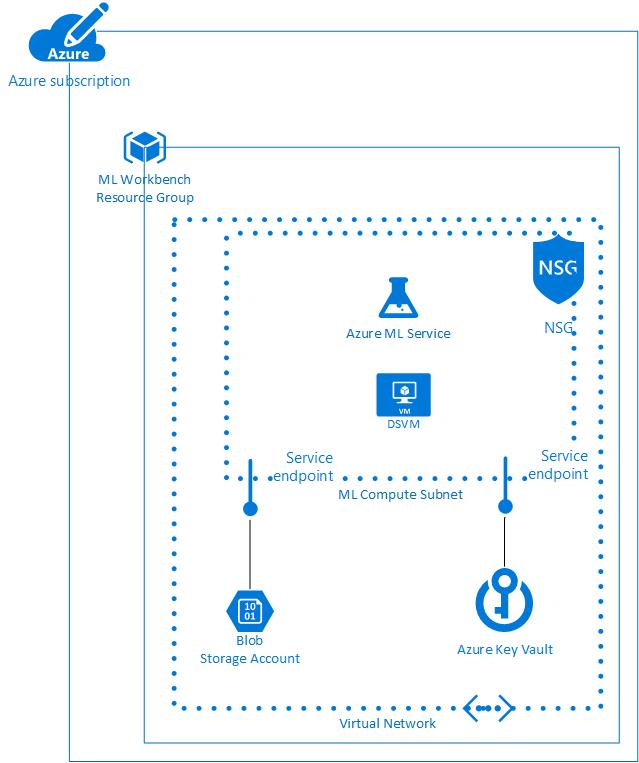6.6 KiB
Machine Learning Workbench Template
This template is a secure and flexible workspace for data scientists. It has a deployment of the ML Studio, but also offers a data science virtual machine for added flexibility to meet all work needs. This template is to be deployed inside an existing Virtual Network and connects PaaS services via service endpoints to keep communications secure.
This template will deploy the following architecture:

Running the MLWorkbench Template
Parameters
In the azuredeploy.parameters.json you will need to set the following: (* denotes required parameters)
| Parameter | Description |
|---|---|
| Prefix * | A short prefix that will be added to the name of all resources |
| VirtualNetworkResourceGroupName * | The Resource Group where the Virtual Network exists |
| VirtualNetworkName * | Name of the subnet to deploy into |
| KvObjectID * | The ObjectID of the user, group, or service principle that will have access to Key Vault |
| vmSize | By default, the template chooses Standard_D2_V2 – if this size isn’t available in the location you are deploying to, you should pass a different size here (like Standard_D1_v2) you can get available machine sizes via a powershell commandlet (Get-AzVMSize –Location <insert location ie: eastus2>) |
| osType | Default value is ubuntu, if you provide this, allowed options are: ubuntu centOs windows – these are the different marketplace skus for DataScience vms |
| localAdminUserSecretValue | Script will ask for this if not provided in parameter file (it is more secure to leave it out and provide it in PowerShell when prompted) this will be the local admin username that will be set on the VM (this value will be stored and referenced from KeyVault when the template executes) |
| LocalAdminPasswordSecretValue | Script will ask for this if not provided in parameter file (it is more secure to leave it out and provide it in PowerShell when prompted) this will be the local admin password that will be set on the VM (this value will be stored and referenced from KeyVault when the template executes) |
Considerations
This template deploys to an existing VNET and subnet. You can set these valuesin the parameters file. Note that the subnet needs to have Service Endpoints configured for KeyVault. The template currently only provides for the VNet/Subnet to be in the same subscription as the ML environment you are creating.
You will need to have a storage account (in the subscription you are creating the ML environment in) for artifacts to be uploaded to. The template will create the storage account and container if they do not exist. Note that the storage account name needs to be globally unique.
To Login to your azure subscription in local PowerShell (not necessary in cloud shell, and assumes latest az powershell module is installed locally): Login-AzAccount
Ensure you are working in the appropriate subscription
If you have access to multiple subscriptions – this will deploy to the default subscription that the PowerShell session authenticates to. Check the currently selected subscription by using: Get-AzContext
This will list the current default selected subscription To change this to a different subscription try the following:
$context = Get-AzSubscription –SubscriptionId <paste id of subscription to switch to>
Set-AzContext $context
Accept the DSVM legal terms before running:
This template deploys the Azure Marketplace image of a Data Science Virtual Machine. To successfully deploy, you must first accept the terms of use. You can read the terms here.
You can accept the terms with the following PowerShell command:
Get-AzMarketplaceTerms -Publisher "microsoft-ads" -Product "linux-data-science-vm-ubuntu" -Name "linuxdsvmubuntu" | Set-AzMarketplaceTerms -Accept
Deploy
All files need to exist in the directory you deploy from. The following command will deploy the template:
.\Deploy-AzureResourceGroup.ps1 -ResourceGroupLocation "<region>” -UploadArtifacts -ResourceGroupName "<defaults to MLWorkbenchTemplate if not provided>" -StorageAccountName "<name>" -StorageContainerName "<name>"
Other optional Parameters:
-ValidateOnly - will only validate that the template is valid with the provided parameters (will prevent the script from actually deploying any artifacts)
-DSCSourceFolder - this is used for configuration management, which is not currently used in this template